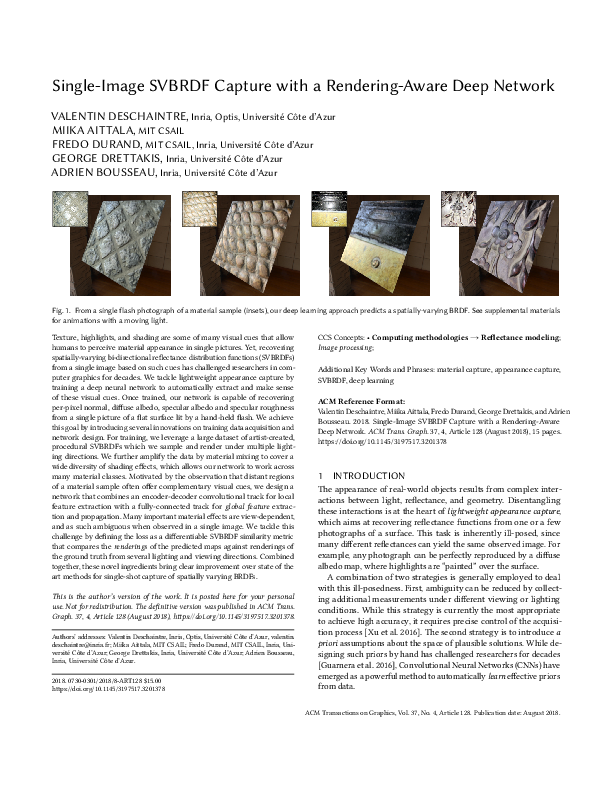

Pretrained models are provided in the code archive. Results, datasets and supplemental materials are available on a second project page (https://team.inria.fr/graphdeco/projects/deep-materials/). This review corresponds to a new version of the code with a special fix to make it work with recent tensorflow (>2). Just edit the first lines of material_net_test.py (lines 18-19) to enable tensorflow>2. Once fixed, I was able to reproduce most results of the paper.
Pretrained models are provided in the code archive. Results, datasets and supplemental materials are available on a second project page (https://team.inria.fr/graphdeco/projects/deep-materials/). This review corresponds to a new version of the code with a special fix to make it work with recent tensorflow (>2). Just edit the first lines of material_net_test.py (lines 18-19) to enable tensorflow>2. Once fixed, I was able to reproduce most results of the paper. On Catalina, you may have an issue with protobuf. The following upgrade of the packages solves the problem: python -m pip install --upgrade pip python -m pip uninstall tensorflow tensorflow_estimator protobuf python -m pip install tensorflow python -m pip install lxml
Pretrained models are provided in the code archive. Results, datasets and supplemental materials are available on a second project page (https://team.inria.fr/graphdeco/projects/deep-materials/). No dependency issue (just tensorflow installed using conda, version 2.1, the authors do not give the exact tensorflow version they are using) but the runExampleTest.sh does not work directly (tensorflow API issues). After performing these edits:
148c148
< resized_images = tf.image.resize(batch_input, [in_height * 2, in_width * 2], method = tf.image.ResizeMethod.NEAREST_NEIGHBOR)
---
> resized_images = tf.image.resize_images(batch_input, [in_height * 2, in_width * 2], method = tf.image.ResizeMethod.NEAREST_NEIGHBOR)
248c248
< image_string = tf.io.read_file(filename)
---
> image_string = tf.read_file(filename)
294c294
< r = tf.image.resize(r, [a.scale_size, a.scale_size], method=tf.image.ResizeMethod.AREA)
---
> r = tf.image.resize_images(r, [a.scale_size, a.scale_size], method=tf.image.ResizeMethod.AREA)
382c382
< return (tf.math.log(tf.add(tensor,0.01)) - tf.math.log(0.01)) / (tf.math.log(1.01)-tf.math.log(0.01))
---
> return (tf.log(tf.add(tensor,0.01)) - tf.log(0.01)) / (tf.log(1.01)-tf.log(0.01))
616c616
< tf.random.set_seed(a.seed)
---
> tf.set_random_seed(a.seed)
I ended up with an issue I was not able to solve:
Traceback (most recent call last):
File material_net_test.py , line 752, in <module>
main()
File material_net_test.py , line 644, in main
examples = load_examples(a.input_dir, a.mode == train )
File material_net_test.py , line 330, in load_examples
iterator = batched_dataset.make_initializable_iterator()
AttributeError: BatchDataset object has no attribute make_initializable_iterator
Editing line 330 with
iterator = tf.compat.v1.data.make_initializable_iterator(batched_dataset)
produces
RuntimeError: dataset.make_initializable_iterator is not supported when eager execution is enabled. Use or element in dataset instead.
This a more complex issue than just some API changes (and I am not expert in tensorflow).
I was not able to create a conda env with a 1.7 or 1.8 tensorflow (which may correspond to the tensorflow the authors used) due to CUDA incompatibility issues.Pretrained models are provided in the code archive. Results, datasets and supplemental materials are available on a second project page (https://team.inria.fr/graphdeco/projects/deep-materials/). No dependency issue (just tensorflow installed using pip, version 2.1.0, the authors do not give the exact tensorflow version they are using) but the runExampleTest.sh crashes on my system with the following error code (which I was not able to solve): [libprotobuf ERROR google/protobuf/descriptor_database.cc:394] Invalid file descriptor data passed to EncodedDescriptorDatabase::Add(). [libprotobuf FATAL google/protobuf/descriptor.cc:1356] CHECK failed: GeneratedDatabase()->Add(encoded_file_descriptor, size): libc++abi.dylib: terminating with uncaught exception of type google::protobuf::FatalException: CHECK failed: GeneratedDatabase()->Add(encoded_file_descriptor, size): ./runExampleTest.sh: line 2: 25883 Abort trap: 6 python3 material_net_test.py --input_dir inputExamples/ --mode eval --output_dir examples_outputs --checkpoint . --imageFormat png --scale_size 256
If you want to contribute with another review, please follow these instructions.
Please consider to cut/paste/edit the raw JSON data attached to this paper.